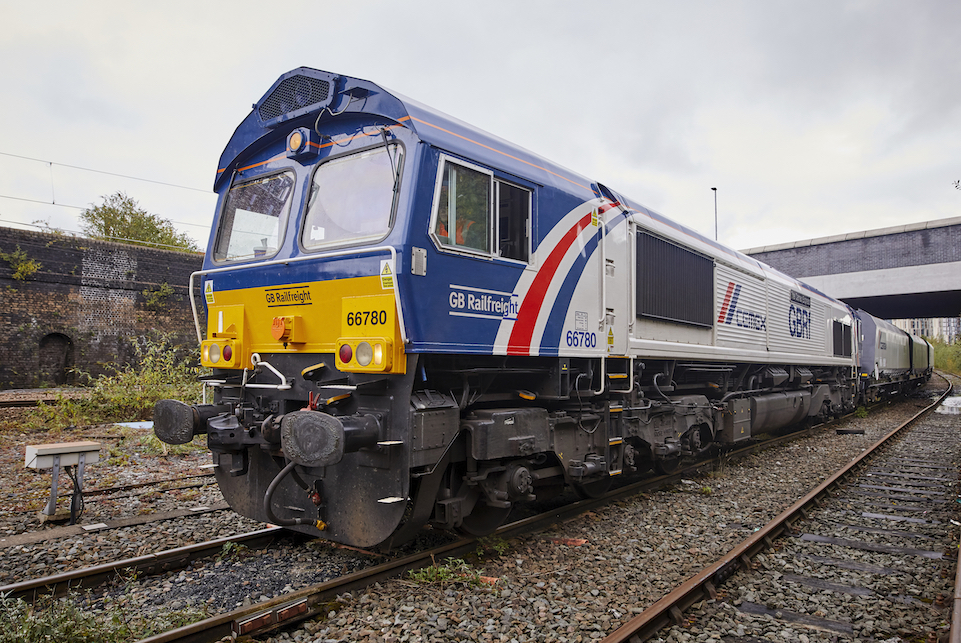A new report sets out the economic and environmental case for more rail freight into Greater Manchester. The metropolitan area around Manchester is experiencing a significant construction boom, and the vital part played by rail freight has been recognised in a joint report from the Mineral Products Association (MPA) and the Rail Freight Group (RFG), the representative bodies for each sector.
Published in the first week of January, just as the construction industry swings back into action, ‘Building Better with Rail Freight in Greater Manchester’ highlights the benefits of rail freight over road haulage for transporting essential construction materials like aggregates and cement. Although well served by an extensive motorway network, Manchester suffers an increasing congestion problem, and expansion of the rail network, for both passenger and freight has been identified as critical to the city’s economic growth. With up to 125 heavy goods vehicles replaced by convoy, the advantages are clearly stated in the report, which urges rapid development of the freight network around the ten boroughs of Manchester.
Protecting land for urban rail terminals
The MPA is the trade association for the aggregates, asphalt, cement, concrete, dimension stone (cut and machined products), lime, mortar and industrial sand industries. The MPA is an amalgamation of several legacy trade bodies, and has a growing membership of 520 companies. According to the report, MPA members supply around 200 million tonnes of aggregates and nine million tonnes of cement each year to meet UK demand. Working with the freight operating companies that form the Rail Freight Group membership, around ten per cent of these materials are transported by rail, with the vast majority going by road. “That places mineral products as the second largest market segment on the rail network after containerised intermodal freight”, the report explains. “MPA and RFG believe there is a huge opportunity to grow the use of rail for construction materials, reducing lorry [truck] miles, alleviating traffic congestion and reducing carbon emissions.”

The new report sets out the steps the mineral products and rail freight industries are taking to deliver that growth, and explains how local and national government, as well as Network Rail, can help support the industries’ ambitions. Among the issues highlighted in the report are protecting parcels of land for use as urban rail terminals in the planning system, ensuring affordable and competitive track access charges, prioritising the timetabled slots for freight, and supporting electrification and other steps that support decarbonisation. A case study is made of the Cemex terminal in Salford, which handles vast quantities of materials, whilst avoiding disturbance to a neighbouring school, nor religious observance at nearby Salford Cathedral.
Meet Manchester’s material needs by rail
“Greater Manchester has one of the fastest growing economies in the UK, and is seeing investment in new homes, offices and infrastructure”, said Maggie Simpson, Director General of the Rail Freight Group. “Rail freight is already helping to minimise the carbon emissions of this construction, and with the right policy environment in place our members will be able to transport more products by rail into the region, reducing the number of lorries on our roads.”

Showcasing key investments made by MPA members in Greater Manchester, the Building Better with Rail Freight in Greater Manchester report underscores the role played by rail freight bringing in essential materials into the city to support infrastructure improvements, community regeneration and the building of new homes. All build development and economic growth require aggregates and cement, along with downstream products like concrete and asphalt. “Rail freight is an environmentally efficient way for MPA members to deliver aggregates and cement to city centre locations where they are in the greatest demand”, said Robert McIlveen, Director of Public Affairs at MPA. “We would love to see the market for materials by rail grow to allow the industry to supply more materials in a more efficient and environmentally friendly manner and we hope that government policy will help to deliver more desired outcomes for all.”
